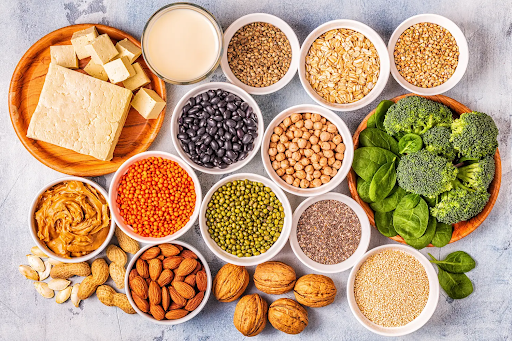10 Surprising Health Benefits of Swapping Meat for Plant Based Chicken
All About Healthy And Balanced Food: Benefits of Embracing Plant Based Alternatives
The conversation surrounding plant-based diet regimens has obtained considerable attention over the last few years. Lots of individuals are exploring the possible health benefits, dietary benefits, and environmental influences related to these nutritional selections. As individuals come to be extra knowledgeable about their food's influence on wellness and sustainability, questions develop regarding the practicalities of taking on such a lifestyle. What certain adjustments can one expect, and how might these selections improve not just personal health and wellness but likewise the earth's future?
Understanding Plant-Based Diets
Many individuals associate plant-based diet plans generally with vegetarianism or veganism, these diet regimens can encompass a large array of eating patterns that prioritize entire, minimally processed plant foods. Such diet regimens usually include fruits, veggies, whole grains, nuts, beans, and seeds, while removing or restricting pet items. This flexibility allows people to tailor their nutritional choices according to personal preferences and dietary requirements. Some may take on a primarily plant-based diet while still sometimes consuming meat or milk, usually described as a flexitarian method. The focus continues to be on including even more plant foods, which can bring about a varied array of dishes and tastes. Recognizing these numerous interpretations of plant-based consuming is essential for appreciating its availability and charm in modern food society.
Wellness Conveniences of Plant-Based Foods
The health and wellness benefits of plant-based foods are significant, providing a nutrient density benefit that sustains total well-being. Research suggests that these foods can boost heart wellness and play a vital function in efficient weight administration. By integrating a lot more plant-based alternatives, individuals may improve their dietary options and promote lasting health.
Nutrient Thickness Benefit
Nutrient density plays a necessary function in the health and wellness advantages of plant-based foods, making them an engaging option for those looking for a balanced diet plan. Plant-based foods, such as fruits, vegetables, legumes, nuts, and whole grains, are commonly abundant in vital vitamins, minerals, and antioxidants while being lower in calories. This high nutrient thickness permits individuals to consume fewer calories while still satisfying their nutritional requirements. In addition, these foods are loaded with dietary fiber, advertising digestion health and wellness and assisting in weight management. By integrating nutrient-dense plant-based options, customers can boost their total health, sustain their immune systems, and lower the risk of persistent conditions. Inevitably, the nutrient thickness of plant-based foods emphasizes their value in a health-conscious way of life.
Heart Health And Wellness Improvement

Weight Management Assistance
In enhancement to advertising heart health and wellness, a plant-based diet can significantly assist in weight management. This nutritional strategy highlights whole foods such as fruits, vegetables, legumes, nuts, and whole grains, which are normally lower in calories and greater in fiber compared to animal-based items. The high fiber web content aids boost satiation, lowering general calorie consumption. Furthermore, plant-based diet plans are often rich in vital nutrients while low in harmful fats, making it much easier to preserve a healthy weight. Sugar Free Sauces. Research study shows that individuals who take on a plant-based lifestyle often tend to have reduced body mass indexes (BMIs) and experience even more effective weight loss contrasted to those that consume meat-heavy diets. As a result, embracing plant-based options is a critical option for reliable weight administration
Nutritional Value of Plant-Based Ingredients
Plant-based active ingredients are rich in crucial nutrients, offering a diverse array of vitamins, minerals, and antioxidants that contribute to overall health and wellness. A contrast of healthy protein sources reveals that while animal items are commonly considered as remarkable, numerous plant-based choices offer ample healthy protein and various other useful compounds. Understanding the dietary worth of these ingredients can help individuals make educated nutritional choices.
Important Nutrients in Plants
Nutrient-rich components found in plants use a diverse variety of essential minerals and vitamins that contribute greatly to overall health and wellness. These ingredients are rich in vitamins A, C, and K, which support immune feature, vision, and blood clotting, respectively. Additionally, plants give essential minerals such as magnesium, potassium, and calcium, important for heart health and wellness, muscular tissue feature, and bone stamina. The existence of fiber in plant-based foods help food digestion and promotes a healthy and balanced gut microbiome. Antioxidants, found generously in vegetables and fruits, aid fight oxidative anxiety and minimize inflammation. Additionally, several plant foods are low in calories yet high in nutrients, making them an excellent option for those seeking to keep a healthy and balanced weight while making sure suitable nutrient intake.
Contrasting Healthy Protein Resources
Protein resources differ substantially in their dietary accounts, with plant-based ingredients providing distinct advantages. Unlike pet healthy proteins, which usually have hydrogenated fats and cholesterol, plant proteins tend to be reduced in these undesirable parts. Legumes, nuts, seeds, and entire grains are rich in vital amino acids, fiber, vitamins, and minerals. For example, lentils provide high healthy protein material alongside substantial iron and folate, while quinoa is a full protein, offering all 9 vital amino acids. Furthermore, plant-based proteins are usually gone along with by anti-oxidants and phytochemicals that sustain overall health and wellness. The shift to plant-based healthy protein sources not just enhances dietary consumption navigate to this website however additionally lines up look at this web-site with lasting dietary techniques, decreasing ecological impact and advertising long-term health and wellness advantages.
Environmental Effect of Plant-Based Consuming
As awareness of environment change grows, several people are checking out lasting dietary options that can greatly minimize their ecological footprint. Plant-based eating has actually become a considerable factor to reducing greenhouse gas discharges, which are largely related to animals production. The growing of fruits, beans, veggies, and grains commonly needs fewer resources, such as water and land, contrasted to pet farming. In addition, plant-based diets can result in reduced logging, as much less land is required for grazing animals or growing animal feed. By shifting towards plant-based choices, customers can sustain biodiversity and advertise much healthier communities. Generally, accepting plant-based eating not only benefits individual wellness however likewise stands for a crucial action towards ecological sustainability and conservation efforts.
Overcoming Common Misconceptions
While numerous people identify the advantages of a plant-based diet regimen, numerous misconceptions often deter them from fully embracing this lifestyle. An usual idea is that plant-based diet plans lack sufficient protein; however, countless plant resources, such as vegetables, nuts, and tofu, supply sufficient protein. Additionally, some think that this diet regimen is costly, when actually, staples like beans, rice, and seasonal vegetables can be quite inexpensive. One more mistaken belief is that plant-based consuming is overly restrictive, whereas it actually offers a diverse range of flavors and foods. Lots of worry that a plant-based diet regimen may lead to shortages, yet with correct planning, individuals can obtain all needed nutrients, consisting of minerals and vitamins, while delighting in a broad selection of delicious dishes.
Tips for Transitioning to a Plant-Based Lifestyle
Making the shift to a plant-based way of living can be an enhancing experience, though it usually calls for some assistance to browse the preliminary changes. Initially, individuals are motivated to start gradually, incorporating even more fruits, veggies, legumes, and whole grains right into their meals while minimizing meat and milk usage. Meal planning is important; preparing an once a week menu can assist relieve the modification and prevent last-minute harmful selections. Checking out cooking methods and brand-new dishes can also maintain and enhance the experience excitement about plant-based consuming. Additionally, joining support system or neighborhoods can supply inspiration and share valuable ideas. Ultimately, staying notified concerning nutrition warranties balanced meals, preventing shortages while cultivating a healthy, rewarding plant-based way of living.
Delicious Plant-Based Meal Ideas
Discovering tasty plant-based dish concepts can inspire individuals to accept a much more healthy diet regimen. One prominent alternative is a passionate quinoa salad, featuring cherry tomatoes, cucumber, and a tangy lemon-tahini dressing. One more fave is a savory lentil stew, packed with carrots, celery, and aromatic herbs, ideal for a calming dinner. For breakfast, over night oats made with almond milk, chia seeds, and covered with fresh berries offer a nutritious begin to the day. In addition, a lively veggie stir-fry with tofu and a variety of vibrant veggies can be a fast yet satisfying dish. Finally, creamy avocado toast on whole-grain bread, sprayed with seeds and spices, uses a basic yet savory snack. These meals display the selection and richness of plant-based consuming.

Regularly Asked Concerns
Can a Plant-Based Diet Plan Supply Sufficient Healthy Protein?
The question of whether a plant-based diet regimen can give enough protein is common. Numerous sources, including legumes, nuts, seeds, and entire grains, can fulfill healthy protein needs effectively, sustaining a healthy and well balanced diet for people.
Are Plant-Based Diet Plans Appropriate for Children?
The viability of plant-based diets for youngsters depends on cautious preparation. Appropriate nutrients have to be guaranteed, consisting of proteins, minerals, and vitamins. With correct support, such diet regimens can support healthy growth and advancement in kids.
Exactly how Do I Eat in restaurants on a Plant-Based Diet regimen?
Dining out on a plant-based diet entails looking for restaurants with diverse food selections, asking for adjustments, and exploring vegan-friendly options. Planning in advance and connecting nutritional preferences can improve the eating experience while keeping nutritional choices.
What Are Usual Irritants in Plant-Based Foods?
Usual allergens in plant-based foods consist of soy, gluten, nuts, and seeds - Sugar Free Sauces. Individuals complying with a plant-based diet regimen needs to recognize these irritants and review labels thoroughly to prevent adverse responses and ensure risk-free usage
Can Plant-Based Diets Aid With Weight Reduction?
Study indicates that taking on a plant-based diet may assist in weight loss because of its generally reduced calorie thickness and greater fiber web content. This combination can enhance satiety, assisting people handle their caloric consumption successfully. Lots of individuals link plant-based diet plans generally with vegetarianism or veganism, these diet plans can encompass a large array of eating patterns that focus on entire, minimally processed plant foods. Nutrient thickness plays an important function in the health and wellness advantages look at this now of plant-based foods, making them a compelling option for those seeking a well balanced diet plan. Plant-based diet plans have actually been revealed to substantially enhance heart health, as they usually contain elements that sustain cardiovascular feature. In addition to advertising heart wellness, a plant-based diet plan can considerably help in weight administration. An usual idea is that plant-based diets lack adequate protein; nonetheless, countless plant resources, such as legumes, nuts, and tofu, provide adequate protein.